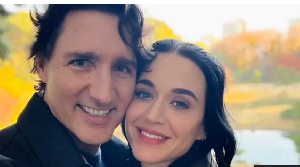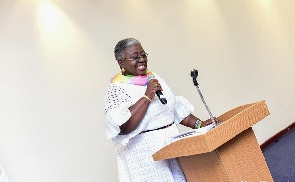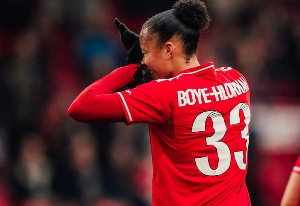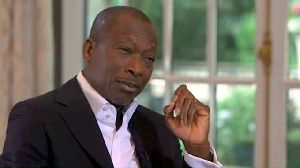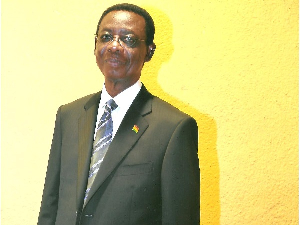Even though “no new laws are needed” to “regulate” social media, everyone must be concerned about its “excesses” during the political season, former Ghana Journalists Association president Gifty Afenyi Dadzie has said.
“Increasingly, social media has assumed prominence and high patronage in Ghana. A challenge that goes beyond the GJA and which must be of paramount interest to all of us is how do we deal with the excesses of social media, especially in approaching the election year?” she asked in a speech delivered at the International Press Centre in Accra on Wednesday, 3 May 2023 to mark World Press Freedom Day.
“It is true that most ideas generated in the public sphere are about sport, culture, fashion, gossip and commerce, etc. We know for a fact, however, that in an election season, many more will use social media to articulate their views on politics. We do not need new laws to regulate social media but the GJA working with all the relevant stakeholders can monitor the public sphere and promote key ethical considerations for reflection”, she advised.
She also noted that “excessive politicisation” of issues by the media “is a real threat to our democracy as it also leads to a downplay of the media’s demand for accountability from all the political actors."
She added: “Equalisation cannot be the way forward for our beloved country."
“The distinguished author, Salman Rushdie, has said that: ‘Two things form the bedrock of any open society – freedom of expression and rule of law. If you do not have these things, you do not have a free country’," she quoted.
Read Mrs Gifty Afenyi Dadzie’s full speech below:
SPEECH DELIVERED BY HON MRS GIFTY AFFENYI – DADZIE AT THE 2023 WORLD PRESS FREEDOM DAY COMMEMORATION HELD AT THE GHANA INTERNATIONAL PRESS CENTRE – 3RD MAY 2023.
Good morning distinguished ladies and gentlemen and thank you (the one who introduced you) for the kind words. I am very grateful to the GJA for this invitation.
Salutation (Adapt to suit):
GJA President and the Executive, Minister of Information, National Media Commission, Ministers of State, Honourable Members of Parliament, UNESCO Country Representative, UN Co-ordinator and other missions represented here, Chief Executives of Media Houses and other organizations, GIBA, PRINPAG, ASWIM, Representatives of Civil Society Organisations, Traditional rulers (if any), friends from the media, ladies and gentlemen.
The local theme for this year’s World Press Freedom Day is ‘Freedom of Expression: A driver for all human rights for Ghana’s development’; obviously this has been derived from the global theme. Freedom of Expression has never been the preserve of the media: It is the oxygen driving democratic societies. No wonder the first issue tackled under Article 21 of the 1992 Constitution that has been subtitled ‘general fundamental freedoms’ is freedom of speech and expression. The peaceful co-existence of religious groups is anchored in the right of citizens to express themselves in a way they find appropriate to express their beliefs. The Kumepreko, Let My Vote Count and the picketing by individual bond holders are all underpinned by freedom of expression even if particularised as freedom of assembly.
The freedom of speech on our radio stations and the numerous newspaper publications bear testimony to the fact that Ghana is making tangible progress in democratic governance. The progress in the field of Freedom of Expression notwithstanding, I believe there are areas involving the media that require a more sober reflection. The Media has been given a responsibility by the 1992 Constitution of the Republic to demand accountability. Article 162 clause 5 is explicit that the mass media shall uphold the responsibility and accountability of the Government to the people of Ghana.
One shining example in agenda setting and the demand for accountability has been the work of the media coalition on illegal mining or galamsey which was launched in April 2017. The media played its part in raising concern about the dangers of galamsey, which threaten our future existence. Subsequent development has shown that the beneficiaries of galamsey are very powerful and would not easily give up irrespective of the danger to our water bodies and environment. On this occasion, it is relevant to remind ourselves that based on the happenings we know now, the agenda to stop galamsey should be treated as a major existential threat that should go beyond the coalition that first highlighted the menace. I believe all media houses should continually highlight the challenges until the menace is brought to a minimum. Already all of us are paying far more for water because of the pollution suffered by our water bodies and the increasing cost to the Ghana Water Company in treating the water for our houses and industries.
Based on what we know now in terms of our developmental challenges, it is my expectation that the Ghanaian media shall develop a stronger interest in the economic management of our dear nation and demand answers to nagging issues including corruption and incompetence which have the potential to roll back our advancement as a country. A major drain on the country’s finances is the performance, or rather nonperformance, of our state-owned enterprises. Instead of contributing to the nation’s revenue, a high number of such enterprises continue to incur huge losses that are invariably borne by the taxpayer.
According to the 2020 STATE OWNERSHIP REPORT released by the Ministry of Finance, State Owned Enterprises recorded a 2.6 billion Ghana cedis loss in 2020. As a country, we need a frank conversation on the performance of our state-owned enterprises to really understand what the issues are and the best way forward. Still on the management of the economy, we need to reflect also upon the mandate of Parliament in holding the Executive to account. My candid opinion is that Parliament while doing well in some areas of their mandate has not been able for whatever reason(s) to effectively play its role as a countervailing force to the Executive. A stronger collaboration between Parliament and the media would be a healthy way of keeping the Executive on its toes especially in between elections.
In examining the constitutional provisions on freedoms, one comes across the phrase ‘subject to the rights of others and the national interest’. The heat is already building up towards the 2024 presidential and parliamentary elections. The peace of our dear nation needs to be safeguarded. One of the surest ways to plunge a country into chaos is inflammatory language. The media should play its gatekeeping role so well that decency shall become paramount in the conduct of people that seek the mandate of the electorate to rule.
I am convinced that media owners need to seriously reflect on the acquisition of delayed broadcast equipment to help sieve the contributions of those who call-in to programmes to make one contribution or the other as well as a panelist who goes overboard to throw a bomb. One other organ that could help sanitise the political campaign environment is the GJA’s Ethics and Disciplinary Council which is mandated to promote high ethical standards among members of the Association in the performance of their duties , enforce the GJA code of ethics, and investigate allegations of unprofessional conduct and ethical breaches of the Association.
Increasingly, social media has assumed prominence and high patronage in Ghana. A challenge that goes beyond the GJA and which must be of paramount interest to all of us is how do we deal with the excesses of social media, especially in approaching the election year. It is true that most ideas generated in the public sphere are about sport, culture, fashion, gossip and commerce, etc. We know for a fact however that in an election season, many more will use social media to articulate their views on politics. We do not need new laws to regulate social media but the GJA working with all the relevant stakeholders can monitor the public sphere and promote key ethical considerations for reflection.
It is said that an unexamined life is not worth living and I want to give a special charge to the GJA National Council to reflect on the conduct of our members in recent years and to deal with potential breaches that could spark election violence. God has been merciful to us as a country in the eight general elections held so far in the dispensation of the 4th Republic. We must not assume that we would continue to have peaceful elections without a proactive and conscious determination by all the critical players: Political Parties, Candidates, Media, Civil Society Organisations, the Police, the Electoral Commission and other institutions to do what is right in consolidating the democratic credentials of our country. Actors must not only be fair but should also be seen as fair by all interested parties.
Excessive politicisation by the Media is a real threat to our democracy as it also leads to a downplay of the Media’s demand for accountability from all the political actors. Equalization cannot be the way forward for our beloved country. The distinguished Author Salman Rushdie has said that ‘Two things form the bedrock of any open society – freedom of expression and rule of law. If you do not have these things, you do not have a free country.’
We celebrate the Ghanaian media today for its impactful contribution to the consolidation of Ghana as an open society through freedom of expression and look forward to many years of responsible journalism. I entreat the co-operation of all the distinguished personalities gathered here today for a successful program.
Thank You.
General News of Thursday, 4 May 2023
Source: classfmonline.com
How do we deal with social media excesses in election seasons? – Afenyi Dadzie asks
Entertainment
